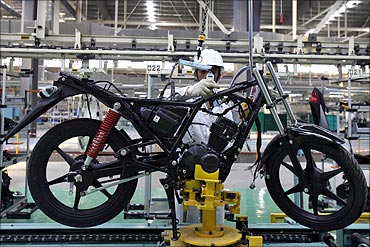A government that confuses PowerPoints for policy is delaying structural change too much, notes Mihir S Sharma.

Addressing the Association of South East Nations summit on Saturday, Prime Minister Narendra Modi said that "the second wave of structural and financial reforms have been launched".
The purpose, he said was to "reform to transform" - reform is just a "way-station on the long journey to the destination", which was the transformation of India. In spite of the fact that one worries the central idea was essentially to find something that rhymes with "reform", the PM is not wrong. Reform is in fact something that must be deep, structural and transformative.
However, you have to ask - does the PM really believe that the reforms that have been introduced so far are of the transformative variety? If so, he is - at best - misinformed and poorly advised.
This is not to say that nothing has been done. In the flurry of economic policy changes announced in order to distract the media from the Bihar assembly results, there have been several positive moves.
The relaxation of foreign direct investment caps and requirements is one among them. The reworking of state's power-related debts is another.
But none of these changes are transformative in nature. Even the power reforms - while a genuine achievement - essentially clean up state electricity boards' books and allow them to borrow more, while leaving the central problem untouched.
Profligate states will now borrow for their own power bonds, which the market will correctly view as being backed by the sovereign. We have just stored up trouble for the future again - in essence, something not very different from the previous two times that power debt was restructured.
And the foreign direct investment relaxation fails, to take just one example, to address the very real questions surrounding the growth of e-commerce. In the words of one observer "they don't seem to understand e-commerce at all".
Unsurprisingly, brick-and-mortar retail is now using the legal and policy confusion the government has introduced into the sector as a method by which to challenge successful e-retail sites in the courts.
And once something gets into the Indian legal system, proper reform is hamstrung - as is clear from what happened to the open access to power from anywhere that was promised under Electricity Act, a promise which has remained on paper thanks to state electricity boards using the courts to protect themselves from competition.
Clearly, nobody in the administration seems to be making the case forroot-and-branch reform. Certainly, the PM himself showed a worrying degree of complacency in declaring, both at the Asean summit and previously at the finance ministry's economics conclave in Delhi, that his government had already achieved a great deal.
It had brought down the fiscal deficit, stabilised the rupee and the current account deficit, and reduced inflation, he argued. Has nobody shown Mr Modi the numbers?
They suggest India's current account deficit at 1.2 per cent of GDP would in fact have been three per cent of GDP had oil prices not suddenly taken a downturn.
Lower inflation has been imported, not produced domestically through supply-side reform. diesel would be 25 per cent more expensive without low oil prices; electricity price inflation is at two per cent year-on-year instead of the 27 per cent it was in a high-energy-cost world.
And as for the fiscal deficit: the government saved almost Rs 90,000 crore thanks to cheaper oil in its budgeting for 2015-16. Without that, Arun Jaitley's fiscal mathematics would have been impossible.
In effect, whatever "good times" we're having now - and, frankly, they aren't yet that good - are not because of anything the government's done. They're thanks to global factors. It's great when that happens - but the truth is that sensible governments, those not ruled by complacency, would take advantage of it.
They would seize the moment and reduce subsidies on kerosene and fertiliser. They would find the cash needed for big infrastructure investment from privatising companies, not just disinvesting a few slices and finding weak excuses for not doing more.
They would address the question of administrative reform - including of income-tax administration - instead of postponing it over and over again. The United Progressive Alliance had favourable global headwinds for years, and did not use them enough to reform.
The National Democratic Alliance is repeating that mistake, except with tacky rhyming slogans added on.
I don't even want to get into the various obvious misses - the draft civil aviation policy that ramps up state intervention in a struggling sector, an approach to foreign trade that ignores mega trade deals, looks distrustfully at free trade agreements, and returns to a 1970s subsidy-and-protection regime. Or at "ease of doing business" changes that imagine electronic filing will remove the impact of intrusive regulations, when the power exists to reform those regulations once and for all.
The truth is even worse than Arun Shourie's claim that the government confuses manages the economy with managing the headlines. The problem is that this government confuses PowerPoints for policy. If you need to over-sell policy changes to investors, then you can rest assured they aren't going deep enough.
The PM recently told industry it wasn't taking enough risks. Well, capital will only take the risks it thinks are worthwhile. The government's job is to make sure the risks are worthwhile - it isn't to browbeat people into taking risks that aren't.
Let's take the most optimistic view, and assume that the government is finally finding its feet. It is 18 months into its term, and is only now beginning to consider basic changes - such as a commission to look into fixing income-tax administration.
One wonders what prevented this from happening months ago. The only possible answers are either complacency or ignorance; choose whichever disturbs you less.
But, even if similar positive moves eventually fructify, ask yourself: when will the government be ready to take the actions they have now begun to contemplate about tax reform, for example?
Is three years into a term early enough to begin a structural reform programme? Especially when, by then, the positive headwinds from lower commodity prices will have begun to ease?
Mr Modi's pro-market backers have long argued that he will be able to correct course soon enough when he realises that his current approach is not working. They may be right; he has certainly shown flexibility about, say, land acquisition.
But there are two problems with this point of view. First: will he be able to realise it's not working before it's too late? And second: if and when he does, will political and global economic realities have turned adverse?
Fixing fertiliser subsidies after two successive bad monsoons is a very different reform to sell than it would have been in July 2014. Boosting investment is a very different proposition after the Seventh Pay Commission than before.
Searching for global funds for the railways and renewable energy will be very different in a world in which there is growth elsewhere than in one in which only India is a bright spot.
The political obituaries were being written for Mr Modi's government after Bihar, but they were far too hasty.
He still has awesome political capital. But it is certainly time to start writing the obituaries for structural reform.
Worst of all, prepare to hear the government and its backers defend weak-kneed and confused "incrementalism" as real, big-bang reform.












 © 2025
© 2025